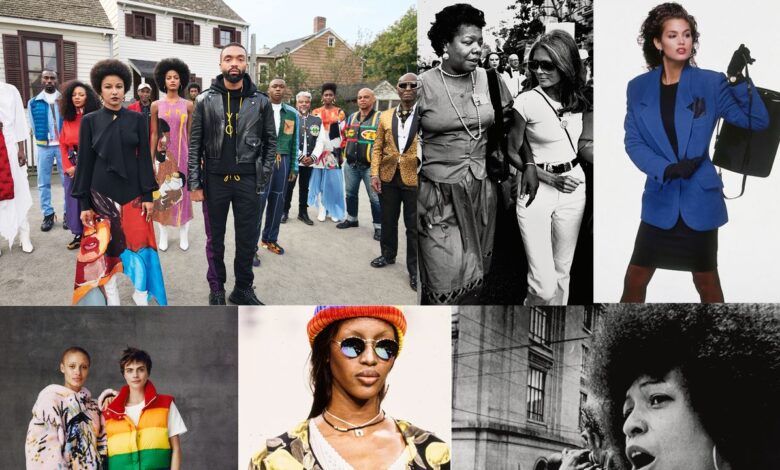Power Dressing: Charting the Influence of Politics on Fashion

Serre’s moon serves as a riposte to ethno-nationalism—if you choose to interpret it that way. The symbolism is ambiguous by design. Martine Rose’s promising britain tee is more direct: Featuring a cartoon clown emerging from a circle of E.U.-flag stars, the shirt debuted as part of a spring 2020 collection Rose showed just as the U.K. was hurtling toward Brexit. “As I see it,” Rose says, “fashion in the absence of opinion and argument is just…merch.”
Maria Grazia Chiuri seems to agree. Seizing the reins at Dior in 2016, she opened her first show with a statement of intent, printing the title of Chimamanda Ngozi Adichie’s essay “We Should All Be Feminists” on tees sent down the runway alongside looks that pointedly updated the aesthetic codes of a house built on the ur-femininity of founder Christian Dior’s New Look. “Declaring my—and the maison’s—wish to step away from the stereotype of women by integrating feminist ideas is a way of keeping Dior’s heritage relevant,” Chiuri explains. “At this stage, being feminist should be the default.”
Feminism, pluralism, eco- and class-consciousness: Designers such as Ross, Rose, Serre, and Chiuri are joining in crucial debates. For Virgilda Romero Vasquez, however, the intersection of fashion and politics is a matter of life and death. A mother of four who began working in L.A. garment factories when she arrived from Guatemala 19 years ago—and who still makes only about $300 a week—Romero Vasquez was, on July 29, impatiently awaiting the result of the California Assembly Labor Committee’s vote on SB-1399, a bill that would eliminate the piece-rate payment system that allows factories in the state to pay sewers well below minimum wage. Romero Vasquez was also recovering from symptoms related to COVID and going to work in a small, airless building where, she told me, it’s often too hot to wear a mask. “We had 40 people working,” she says, “and seven of us got the virus, but only six came back—the other passed away.” (SB-1399 also includes provisions to make brands legally liable for poor conditions in the factories they’ve subcontracted to make their apparel. If the concern seems remote, Romero Vasquez may prompt you to reevaluate: The factory where she previously worked produced almost exclusively for a popular fast-fashion brand with celebrity ambassadors. Meanwhile, she describes the space as rat-infested and says it’s common for the rodents to urinate and defecate on the clothes. “I don’t know why people think they get clean things from a dirty place,” she says.)
Source link
